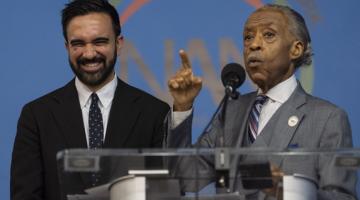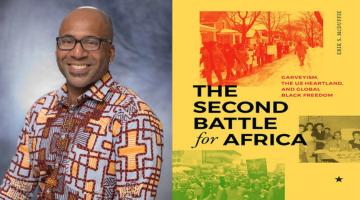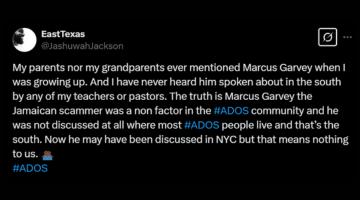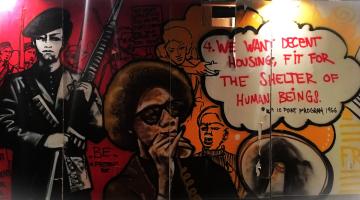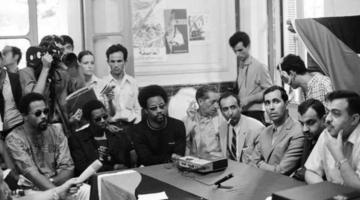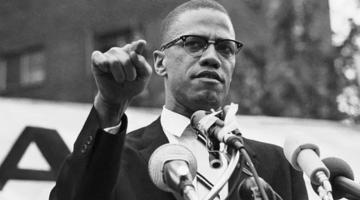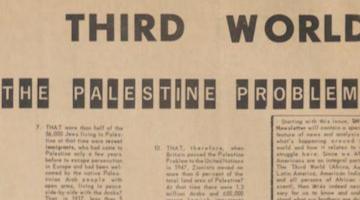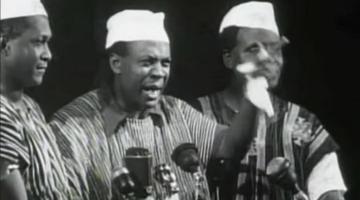Cheikh Anta Diop’s anti-imperialist Pan-African socialism.
Cheikh Anta Diop, the great Senegalese historian, poet, anthropologist, physicist, linguist, and politician, is celebrated for his role in establishing Egypt as a Black African civilization, and demonstrating that African civilizations are the foundation of what came to be called European civilization. Born in Diourbel, Senegal in 1933, Diop challenged the racist bias of European scholarship – “scientific” guesses accepted as truth – especially concerning Egypt. His 1951 Ph.D. dissertation, which explored the influence of Black Africa (Egypt) on European culture, was rejected by the Sorbonne University. Perhaps this should come as no surprise. Diop published the dissertation as Nations negres et culture (Negro Nations and Culture) in 1955.
In the ensuing decades, Diops’s scholarship has earned him respect across the Black world while inspiring a range of Black empowerment and liberation movements, from Afrocentricity to Pan-Africanism. Among his many books, The African Origins of Civilization: Myth or Reality (1974) continues to have global reverberations. Of course, Diop had his European detractors; to this day, many continue to challenge his principle thesis about Egypt. But Diop remains, in the words of historian John Henrik Clarke, “one of the greatest historians to emerge in the African world in the twentieth century.”
Yet Diop’s intellectual concerns were not only historical. While he remains best known for his cultural and historical works, Diop was also a politician in support of African sovereignty and the formation of an African federation of states (a position in stark opposition to that of Francophile Leopold Senghor, Senegal’s first president). He was interested in questions of contemporary African sovereignty and the political economy of the continent, as is evidenced by his little known essay “Africa, China, and the U.S.”
“Africa, China, and the U.S.” gives us a much more robust understanding of the depth and breadth of Diop’s political thinking. In the essay, Diop begins by calling for the defense of China’s rise as a great power, not only to protect socialism (in the way that the world worked to protect the gains of the Russian Revolution from 1917 - 1939), but because, a successful China is in the interest of the Third World: “The interest and security of the Third World demands that all means of development, of domination and demand should no longer be the monopoly of the west.”
What is most significant about the essay is Diop’s criticism of U.S. imperialism. He advises newly (nominally) independent African states that “Imperialism intends to organize anarchy over all the African Continent” to continue its undermining of sovereignty. Diop argued that the US would even support a nuclear powered apartheid South Africa to conquer the entire continent. And Diop warned that African states should avoid the “spectre of South Americanization” - complete US control.
“Africa, China, and the U.S.” was first published in the magazine Jeune Afrique. It was reprinted in translation in 1965 SOULBOOK: The Quarterly Journal of Revolutionary AfroAmerica. At the time, Diop was little-known in the U.S, prompting the editors to include a lengthy introduction describing Diop and his work. The editors were at pains to say that they did not necessarily endorse all of Diop’s viewpoints, but they nevertheless believed that Diop was the intellectual most qualified to give US Blacks an African perspective on the rise of the People’s Republic of China, African independence, and the relationships of those with an imperialist United States.
SOULBOOK’s caveats notwithstanding, Diop’s essay is a tour de force – not only in its prescient analysis of the coming of China as a superpower, and in its understanding of the devastation that US imperialism would bring, but also because of Diop’s articulation of the importance of socialism and the need for Pan-Africanism -- an African Federation to secure liberation and sovereignty. These are lessons that we need today.
We reprint Cheikh Anta Diop’s essay “Africa, China, and the U.S.” below.
Africa, China, and the U.S.
Cheikh Anta Diop
Although Cheikh Anta Diop is not well known in Afroamerica, he, more than any living Black intellectual (for that matter, anybody), has developed approaches to, and theories of Black history. Brother Diop has a theory that there is a basic division of peoples into 2 kinds: the Southerners (or Negro-Africans), and the Aryans. Each grouping has a cultural outlook based on their response to climate, the difference between them being that Aryans have had a harsher climate.
According to Diop, the Aryans have developed patriarchal systems characterized by the suppression of women and a tendency toward individualism, materialism, and pessimism. The Southerners, on the other hand, he sees as possessing a matriarchal system. The women are much freer, the social system is collectivist, and it is optimistic in its orientation towards life.
As for the historical basis of this view, Diop has argued, with a considerable amount of evidence, that ancient Egyptians not only represented a Black African civilization but also that European civilization is merely a derivative of that great society. In a word, his writings on this subject are at least outrageously provocative and, at most, blatantly revolutionary.
We do not give this background to Brother Diop’s orientation in order to endorse his views; on the contrary, we have reservations about some of his conclusions and his emphasis on climate as a determinant of history. However, we do know that his historical findings regarding Pharaonic Egypt and its relationship to Africa and Europe have immense credibility. The main reason we have summarized his theories is to highlight his excellent intellectual and pro-Black credentials so that we can show why we feel Brother Diop is eminently qualified to explain many of the relationships between the People’s Republic of China, the emerging African nations, and the great guardian of the color line, the United States of America.
—The Editors, SOULBOOK
Africa, China, and the U.S.
Cheikh Anta Diop
China, in exploding two Uranium 235 bombs, has just proved that she is capable of having access to thermonuclear power by her own means. Several years are yet necessary, perhaps less than ten, in order for her to constitute an operational arsenal. Also, China of today is comparable to the U.S.S.R. of 1926 to 1938; she needs to build her economy, to consolidate her political regime, and also her technical capabilities. In these undertakings she must shun war at any price in order to gain precious years so that she may acquire the invulnerability of nuclear powers.
China will go to war only in the case of her own defense. The territory of China is sufficiently vast to permit virtually the doubling of her present population (actual density is approximately 80 per square kilometer) and to feed it without needing to expand into a neighboring country’s lands. Therefore, the true danger isn’t in seeing the Chinese reenact the invasion of the Huns and overrunning a Europe which is only a “peninsula off Asia.” Rather, it resides in the fact that, in the end, well-being, higher creative knowledge, technical efficiency, power, and the ability to make demands will no longer be the monopoly of the west.
ELIMINATING AMBIGUITIES
The United States is fully conscious of this situation. It seems to feel that the safeguarding of both their [sic] supremacy and that of the west in general necessitates a preventive war against China; even their press no longer makes a mystery of this position. However, the U.S. can only act with impunity if it succeeds in momentarily isolating China from the rest of the Socialist Camp. The unspeakable American provocations in Vietnam register within this perspective.
(They can lead to war if the U.S. estimates, rightly or wrongly, that the solidarity of the Socialist Camp would fail China, that China wouldn’t benefit from the atomic umbrella and from the air cover of the U.S.S.R.) The war would then spring from a lack of clarity in the positions originally taken.
Today, as in the time of the Korean War, peace is gained in eliminating ambiguities in time. Also, one would like to believe that firm resolutions, which contrast with appearances, have already been taken at the level of discreet diplomacy not leaving to hover in the air any doubts as to the solidarity of the Socialist Camp in the case of a U.S. attack on China under any pretext whatsoever. It is with the aerial protection of the U.S.S.R. that China was able to aid North Korea, and why she would be able to aid Vietnam today. This important condition which could, alone, render effective China’s aid to Vietnam, depends entirely upon the U.S.S.R.; and the reasons for China’s present procrastination are perfectly understood. The presence of Sibylline warning should be fatal to peace.
AGAINST PREVENTATIVE WAR
In the case where all this would proceed with cold calculation and against all expectation, the results would be catastrophic for humanity. They would go beyond the limits of classical Machiavellianism to take on the dimensions of a bankruptcy of man in his attempt to exceed his ethnic category in order to become reconciled with other men and to create a veritable humanity. No lucid being should hope to make the best of a similar situation. The consequences that the people who are suffering and who are fighting for their emancipation would draw from it would be irredeemable and dreadful. China’s technological power is a guarantee of peace and of development because she throws out of tune the old game of the balance of power. World peace will be better assured if a country of the Third World[1] is able to become a center of high intellectual development, of technical power, and of the ability to return tit for tat. This will be a guarantee against possible acts of despotism, of cowardice or of racist genocide; this introduces an advantageous disparity in the distribution of forces on the planet – this is the grain of sand which makes the imperialist machine grate.
It is too often forgotten that modern science is not yet sufficiently implanted in the Third World, and that, for the development of our future plans to be gravely compromised, an abrupt darkening of international relations (which is always possible) would be sufficient. Understanding, of more or less brief duration, between western thermonuclear powers in order to impose a limitation and a minor management on the technical development of the Third World is probable, if there does not exist outside the west a force capable of opposing it if necessary. This is what is understood by these so called powers every time they evoke the problem of dissemination of atomic weapons.
The interest and security of the Third World demands that all means of development, of domination and demand should no longer be the monopoly of the west.
In acting today for the preservation of China, to prevent the destruction of Chinese power still in limbo, the Third World has only to work lucidly towards the consolidation of its security.
In reality, the voice of the unanimous Third World would weigh with an enormous moral heaviness on the decisions of the only two nuclear powers on which the result of the situation depends.
In the particular case of the U.S.S.R., its strength, which is today able to safeguard peace and to serve the development of peoples, was equally menaced with destruction by imperialism when she was in gestation.
All the working peoples, without distinction of color, were then allied in order to hatch it, to protect it from October, 1917 to 1939; longshoremen of every country boycotted the preventive war against the U.S.S.R.; seamen mutinied in order to bring about the triumph of its cause, a cause identified with that of the word revolution. More recently, some scientists, by pure ideological conviction, incurred national indignity and prison in order to permit it (the U.S.S.R) to have access to nuclear and thermonuclear power: [David] Greenglass, Klaus Fuchs, [Bruno] Pontecorvo, etc. On the Ivory Coast, some blacks from the forest dressed in loin-cloths marked X’s on some ends of the bamboo without much realising what they did, it is true; nevertheless, this was their means of signing the Stockholm Appeal destined to assure peace, to forestall a premature war against U.S.S.R. when its nuclear force was not yet assured.
ACTIVE SOLIDARITY
A state which was born and developed in such a moral climate should be available without equivocation, everytime the peace of people is menaced.
A crusade resembling the “peace movement” when the U.S.S.R. had a real need for it, should be newly and immediately launched by the states of the Third World in a show of solidarity with China.
Since the end of WWII the U.S. has been leaving its traditional isolationism, has passed from one extreme to the other, and is now defending its “security” on the shores of each continent, even to the heart of the untrodden forest in the Congo.
A DEFUNCT INDEPENDENCE.
It should be stated that any Black African state is already no longer independent (if independence has ever been effective) for no one would know how to alter his political regime without “uncle sam” becoming suspicious and paying him a visit. The U.S. is anxious to keep Africa in the Western camp, within its own sphere of influence, to speak more clearly. One shouldn’t be able to “keep” an independent country.
The short period of euphoria and of easy terms following the declarations of independence, during which in order to obtain everything all you had to do was hold out your hand is completely ended everywhere.
For want of being organized in time on more viable unitarian political foundations, but implying more personal sacrifices, today only the period of “tears” which is at hand remains. Certain countries deceive themselves in trying to organize their individual safety. However, the only security possible in the actual situation of Black Africa is a collective one. Prospects for the future are gloomy.
Imperialism intends to organize anarchy over all the African Continent in a manner which will keep the political initiative that it has already regained, which had been taken away from it by liberation movements on the eve of independence of these states.
Herein lies a new fact of capital importance, on which it is essential that the attention of Africans polarizes itself.
It is the plague that we have always denounced. Alas! Black Africa strongly risks receiving it as its lot. It is the spectre of South Americanization which haunts it with its cortege of unhappiness and misery.
One still remembers the stirring declarations of [Jânio da Silva]Quadros revealing that he was pushed by obscure forces when he was forced to abandon his authority in Brazil. The U.S. made clear to him, he said, that an underdeveloped country wasn’t able to allow itself to have independent diplomacy. This should be entrusted to an “appropriate power.”
The occurrences in Santo Domingo are of such an nature as to edify even the most indifferent.
In the long run, no amount of “goodness,” “realism,” or “moderation,” would know how to shelter one from this new form of insecurity. Nkrumah is made to sing today, tomorrow it is everyone who will dance like a cicada.[2]
One takes touching precautions to give imperialism the understanding that it will be very well to adapt itself to socialism, for they are not malignant. Their inventors simply wanted to be fashionable in the domain of political expression; thus African Socialism is often a synonym for inoffensive socialism. Soon, as in the manner of the birth of philosophy, each African will walk with his socialist doctrine under his arm.
A CREATION OF HELL
However, one tries in vain to prove to the Americans that there is a difference between the devil whose tail burns like a torch and one whose tail only smokes, because for them, all socialism is a creation of hell, which as such should return there, if necessary with the help of atomic bombs. Forgive our illusions.
Ghana, Mali, Guinea, Tanzania, and Congo ([Brazzaville]) to different degrees are already menaced by imperialism, which does not desire that any political experiment whatsoever, conducted independently of it, might be conclusive, might be able, for that reason, to inspire in other countries inclinations towards independence. Thus, as a demon which torments dwarfs, it amuses itself in undoing the laborious work of the elves with a disconcerting facility.
The personality of General De Gaulle hinders the direct taking in hand of this part of Black Africa by the United States. Meanwhile, the U.S. is devoting itself to a systematic study, to a slicing up of the terrain in a manner of a checkerboard, and to an economic penetration as silent as it is efficacious. Their business groups control the administrative councils of former companies with French names: F.A.O, NOSOCO, SCOA, etc. As a beginning, they have just gotten control of 49% of the shares of the former Bank of West Africa which has now become the International Bank of West Africa.
PRETORIA ORGANIZES
On the other hand, the white minority of South Africa would be able to take the black continent from the rear. The British protectorates, enclaves of Basutoland, Swaziland, and Bachuanaland, are easy prey. The seizure of Southwest Africa is complete, and outside the periodic speeches at the U.N. no one thinks about forcing Pretoria’s[3] hand. The white minority of Southern Rhodesia, which practices the same politics, will draw nearer to her at the opportune moment. The national liberation movements of Angola and of Mozambique seem to be halted or at least stabilized, that is to say, smothered for an unpredictable duration. This has only been possible with the complicity of imperialism. One should keep a close eye on the development of the situation in these two territories.
Congo (L) constitutes an ideal buffer state which would even be able to completely fall within the orbit of South Africa with the consent of the U.S., despite the actual appearances. And the counter-offensive to the independence movement doesn’t stop there. England can explode the Federation of Nigeria whenever she may feel like it; other forms of interference are possible. The reduction of Black Africa to a few small semi-deserted states, engulfed in an endemic anarchy, is not impossible. While there is still time, it would be impossible to overly attract the attention of Africans concerning the preparations of war and the underground forces of South Africa.
The first [nuclear] reactor of this country (South Africa) already branched off several years ago; since that time, other more powerful reactors have probably been constructed in greatest secrecy so as to fabricate and stockpile plutonium in a quantity sufficient for undertaking the construction of tactical atomic bombs. Today, South Africa is sufficiently equipped in technical matters to fabricate bombs of plutonium which will detonate by implosion.[4]
However that may be, the case of Vietnam proves that, the moment at hand, the United States would easily find a pretext in order to provide, if necessary, tactical atomic bombs and others to the white minority. It is known that such devices are already stock-piled at Da-Nang base in South Vietnam, ready for utilization.
The physical separation of the communities that is being realized within the framework of apartheid would render possible a perfect genocide.
Today South Africa is feverishly organizing in order to resist, on the military level, the whole black continent.
It is hoped that the danger will be perceived in time. And it is there that the existence of a center of power outside the west, in the Third World, would permit a victorious offsetting of an eventual duplicity. South Africa constitutes for Black Africa the most serious danger on the road leading to an era of universal understanding!
Before this precise menace, as before the problems of constructing a rational economy and organizing a viable common market, Africans, isolated, are reduced to ineffectiveness. One would like to bring together the egoistic individual advantages of political separation and the collective advantages of political federation of Africa. Surely this is the square of the circle. One begins to realize that egoism vis-a-vis Africa, skillfully set up in a doctrine of “wisdom” doesn’t lead very far.
One understands in an obscure manner that at the end the new forms of insecurity spare no one: witness Goulart, Olympio, Maga, and Toulon.
THE DEFEAT OF BOLIVAR
We are entering into an era of humanity and humiliation. We will leave it only by the adoption of a political situation of a federal nature. One should think about the consequences of Boliver’s defeat with respect to Latin America.
It is certain that the interests of the people are hardly opposed to a similar solution. On the contrary, all invite Dahomians, Senegalese, Ivoiriens, Guineans, Malians, etc. to unite their abilities and powers in order to multiply their capacity to oppose anarchy and foreign domination.
An African political structure, in which an effort of rational economic construction would be undertaken, does not yet exist. Its creation depends only upon Africans. When one attempts to consider economic regroupings outside of political domain, this difficulty is only a transposed illusion. A federal executive is necessary, however embryonic he may be, whom will be transferred a minimum of authority, permitting him, for example, to decide upon regional specialization, after a thorough study; then Senegal’s vocation for a chemical industry would be confirmed; it would the same for the inclination to the heavy metal and light alloy industry of the Guinea - Liberia ensemble; and that of the Ivory Coast for the industry of wood and its derivatives.
TO BE RESPONSIBLE FOR ONE’S OWN FATE
The organisation of an African common market will consist then of studying the volume and outflow of the complementary products thus fabricated. A rational economic organization wouldn’t know how to take precedent over the placing in operation of a valid formula of political unification.
One should note with astonishment that it is not known how to conserve the political experience of the colonial epoch on the plan of unifying diverse territories: the former federations of West Africa and of Equatorial Africa, of which the viability had been proved, are broken up in consequence of egocentric discord.
The originality of African political difficulties resides in the fact that one is obliged to realize by peaceful means that which in history is always accomplished by war and violence, when it is a question of political or cultural unification.
In the absence of a preliminary political solution, each African state will try to become an industrial micro-universe in order to be self-sufficient, all in being obligated to opt for installations of weak power and small capacity.
The groups devoid of power of decision, imposed upon everyone, which would not imply a partial and parallel abandonment of sovereignty, will always be short lived. The African political experience during these last years leaves us without any illusions as to this point of view, even for the Organization of African [U]nity.
But all of that will not have been sorrow lost if it is at this price, and at this price only, that the African masses take cognizance of the fact that their fate lies in their own hands and not elsewhere, and that it is very necessary that they decide to assume responsibility for it.
Footnotes
[1] The Third world is that group of nations that have a common background of oppression and have the common objective of eliminating that oppression.
[2] A cicada is an insect which is noted for the prolonged shrill notes of the male,produced by special sound organs.
[3] Pretoria is the capital of the Republic of South Africa.
[4] Without becoming overly technical it may be stated that basically there exist two ways of obtaining fission material for the construction of atomic bombs;one method, utilizing Plutonium 239, is probably the most widely used by nuclear powers because of the relatively less intricate instrumentation needed for production of this material; The use of Uranium235 as fissionable material is at the heart of the other method, and has only been produced in the West at considerable cost (because of the necessity of refined processes in which over a thousand interlocking units, all functioning perfectly, have been necessary for this production). The advantages in having facilities to produce U235 means that the ability to produce tritium, a key element in the production of the H-bomb, is also near at hand


